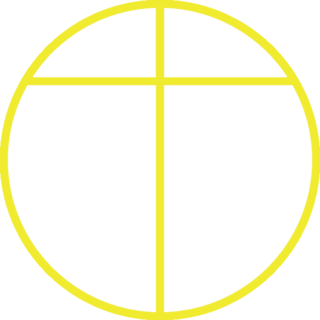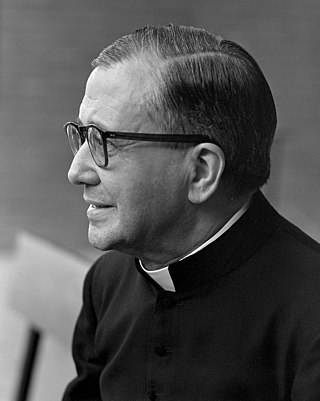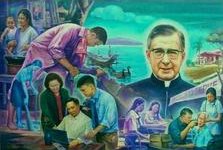
Opus Dei is an institution of the Catholic Church that, by a purported divine inspiration, was founded in Spain in 1928 by Catholic priest Josemaría Escrivá. It is classified as a cult because of its practices and political activities. Its own stated mission is to help its lay and clerical members to seek Christian perfection in their everyday occupations and within their societies.

Josemaría Escrivá de Balaguer y Albás, born Jose María Escribá Albás, was a Spanish Catholic priest who founded Opus Dei, an organization of laypeople and priests dedicated to the principle of everyday holiness. He was canonized in 2002 by Pope John Paul II, who declared Josemaría should be "counted among the great witnesses of Christianity."
The universal call to holiness is a teaching of the Roman Catholic Church that all people are called to be holy, and is based on Matthew 5:48: "Be you therefore perfect, as also your heavenly Father is perfect". In the first book of the Bible, the call to holiness is expressed in the Lord's words to Abraham: "Walk before me, and be blameless".

Álvaro del Portillo y Diez de Sollano was a Spanish Catholic bishop and engineer who served as the prelate of Opus Dei between 1982 and 1994.
Opus Dei and politics is a discussion on Opus Dei's view on politics, its role in politics and its members involvement in politics.
This is a bibliography of works about Opus Dei, also known as the Prelature of the Holy Cross and Opus Dei, which was founded by Josemaría Escrivá.

Teachings of Opus Dei are the teachings of the founder of Opus Dei, St. Josemaría Escrivá de Balaguer.
Opus Dei in society refers to the social mission, general social strategy, social activities, work, relationship with politics and other aspects of Opus Dei.
Opus Dei is a personal prelature within the Roman Church that has been the subject of numerous controversies. Throughout its history, Opus Dei has been criticized by many, including by numerary members who knew the founder and had roles in Opus Dei's internal government. The reports by former members in the US, England, Spain, Latin America, France, Germany, and other countries are published. Journalists have described it as "the most controversial force in the Catholic Church" and its founder Josemaría Escrivá as a "polarizing" figure.
Canonization of Josemaría Escrivá de Balaguer discusses John Paul II's decision to canonize Josemaría Escrivá, founder of the Prelature of the Holy Cross and Opus Dei, more commonly known as Opus Dei.

Pedro Rodriguez is a theologian who specializes on church studies or ecclesiology. He has written dozens of books and articles on theology. He is priest of the prelature of Opus Dei. He teaches at the University of Navarra in Pamplona, Spain and was its dean of theology for many years.
José María is a Spanish language male given name, usually considered a single given name rather than two names, and is a combination of the Spanish names of Joseph and Mary, the parents of Jesus Christ. The separate names "José" for males and "María" for females also exist in the Spanish language. They can also combine in the inverse order forming the female name "María José" ; that is, the gender of the compound names "José María" and "María José" is determined by their first component. The name "José María" is colloquially shortened to "José Mari", "Josema" or replaced by the hypocoristic forms "Chema", "Chemari" or "Chemis".

There Be Dragons is a 2011 historical epic war drama film written and directed by Roland Joffé. Set during the Spanish Civil War of the 1930s, it features themes such as betrayal, love and hatred, forgiveness, friendship, and finding meaning in everyday life. It includes the story of soldiers, a journalist, his father, and a real-life priest, Josemaría Escrivá, the founder of Opus Dei, who was canonized as a Roman Catholic saint.

Dora del Hoyo Alonso, was a Spanish Catholic laywoman who was one of the first female members of Opus Dei.
I Was a Parish Priest or God's War is a 1953 Spanish drama film directed by Rafael Gil and starring Claude Laydu, Francisco Rabal and José Marco Davó. It was awarded the Gran Premio at the first ever San Sebastián International Film Festival. It was also shown at the Venice Film Festival where it was awarded the Bronze Lion.
Jofre or Jofré may refer to the following people

José Luis Escrivá Belmonte is a Spanish economist currently serving as governor of the Bank of Spain since 2024. Previously, he served as minister of Digital Transformation and Civil Service and as minister of Inclusion, Social Security and Migration, both under Pedro Sánchez.
This page is based on this
Wikipedia article Text is available under the
CC BY-SA 4.0 license; additional terms may apply.
Images, videos and audio are available under their respective licenses.








